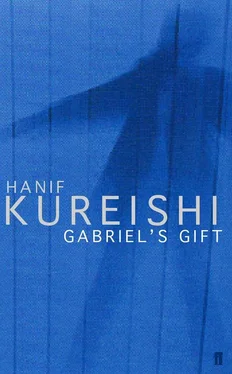Hanif Kureishi - Gabriel's Gift
Здесь есть возможность читать онлайн «Hanif Kureishi - Gabriel's Gift» весь текст электронной книги совершенно бесплатно (целиком полную версию без сокращений). В некоторых случаях можно слушать аудио, скачать через торрент в формате fb2 и присутствует краткое содержание. Год выпуска: 2001, ISBN: 2001, Издательство: Faber & Faber, Жанр: Современная проза, на английском языке. Описание произведения, (предисловие) а так же отзывы посетителей доступны на портале библиотеки ЛибКат.
- Название:Gabriel's Gift
- Автор:
- Издательство:Faber & Faber
- Жанр:
- Год:2001
- ISBN:9780571249428
- Рейтинг книги:5 / 5. Голосов: 1
-
Избранное:Добавить в избранное
- Отзывы:
-
Ваша оценка:
- 100
- 1
- 2
- 3
- 4
- 5
Gabriel's Gift: краткое содержание, описание и аннотация
Предлагаем к чтению аннотацию, описание, краткое содержание или предисловие (зависит от того, что написал сам автор книги «Gabriel's Gift»). Если вы не нашли необходимую информацию о книге — напишите в комментариях, мы постараемся отыскать её.
Gabriel's Gift — читать онлайн бесплатно полную книгу (весь текст) целиком
Ниже представлен текст книги, разбитый по страницам. Система сохранения места последней прочитанной страницы, позволяет с удобством читать онлайн бесплатно книгу «Gabriel's Gift», без необходимости каждый раз заново искать на чём Вы остановились. Поставьте закладку, и сможете в любой момент перейти на страницу, на которой закончили чтение.
Интервал:
Закладка:
What determination?
He was sitting there in the cold and dark. The only sound was of Hannah snoring: the wind of her restless breath whipped under the door and froze his ankles. He wanted to slip under his duvet and go to sleep. But although he cursed Archie’s sense of humour, he couldn’t deny the dead boy’s percipience.
Gabriel had to follow the angel voice where it led.
He smoked half a joint, opened his door, went out of his room and stood on the landing. His mother’s door was always ajar: since he and Archie had been babies, she had left the door open to hear them if they cried.
He pushed her door and stepped into the darkness. He was in her room; he could hear her breathing. He took one more step before hitting an invisible wall and finding himself suspended in space. He landed on the floor.
Reaching out, he realized he had tripped over some shoes, big shoes like blocks of wood. These were not his mother’s. Her shoes, as well he knew, were always in a row under the window.
He was lying on the floor of her bedroom, still as a corpse and about as merry, holding his breath. At least he was face-down on the floor where he wanted to be. If she opened her eyes, she wouldn’t see him, though she might, of course, smell him.
As he listened he realized someone was in bed with her. Not only might she wake up, but the other person — whoever it was — might too, and there’d be four angry eyes condemning him.
There was enough light for Gabriel to drag himself across the floor until he reached the stanchions that supported the bed. He knew his way around under there. Children always noticed the underneath of things; for a long time, like foot soldiers and servants, they only saw the world from below, a good position for noticing how things worked.
The metal drawer was padlocked but the combination lock had given before, when he’d pulled and twisted it. Except he had to do it silently now. He worked as slowly and carefully as he could, but it refused to give way. He felt like crying. How could he ever guess the combination? He remained still and thought hard, before trying — as Archie seemed to be advising — the last four digits of their phone number. It didn’t work. Then he tried the year of his and Archie’s birth. Weren’t most mothers sentimental? The lock opened. He was in. He pulled the drawer.
The rolled-up picture was there, as Archie had said it would be. Gabriel had it in his hand. All he had to do now was get out without being noticed. That shouldn’t be too difficult.
As he went to move mere were hushed voices and even giggles; then the springs started a vigorous vibration. He didn’t think he’d make it across the room and out of the door without being spotted. He’d have to wait. The wooden bed legs were aching by now; in fact they seemed to be groaning, cracking and preparing to give way. Everything could come down with him underneath! He put his hands over his ears. It was terrifying but Archie was holding onto him.
Two in the bed, two under it, their lives living out, this night; and Dad in his room, not far away. Was he awake too?
When it was silent again, and the couple’s normal breathing had resumed, Gabriel crawled out and carried the picture into his room, where he laid it out on his table.
What did he see in it? One big face and other, little faces; animals, lines, colours, movement. Obscure things trying to become clear. It was busy; there was a lot in it, as there was in Lester’s music, with a memorable melody at the front that everyone could enjoy.
This was a good way to look at a picture, or at anything, as if you were about to draw it yourself.
He went to his art cupboard.
Night passed. He stayed up until the morning, working. He had to cover the mirror again because when he looked into it he didn’t see his own reflection but that of Archie, a face the same as Gabriel’s but detectably different in ways he couldn’t have described, though perhaps Archie’s eyes were slightly further apart than Gabriel’s. Gabriel thought of a Plath poem he’d read at school, called ‘Mirror’. ‘I am not cruel,’ it went, ‘only truthful — / The eye of a little god, four-cornered.’
To keep him awake, Archie sang to him, Mozart, Sinatra, Ella and Joe Cocker. With Archie’s hand on his, he copied the picture — twice. Gabriel was used to copying; he knew how to do it, and he enjoyed it. Now there’d be enough art to go round; no one would be left out!
In the morning, Mum called him downstairs. ‘Gabriel, breakfast!’
A man was sitting at the table in the living room, dropping his ash into a saucer. Gabriel had to sit down.
‘This is George,’ said Mum. ‘George, Gabriel. Don’t you remember?’
They shook hands.
Mum was whispering at George about the bar and some dispute she was having with the people there. Then she sent Hannah to the market and went to get ready.
‘Is there any more tea?’ George asked.
In this light George looked younger than Gabriel remembered, in his early thirties, with long dark hair and haughty upper-class features.
Gabriel sniffed. ‘I think so.’
‘Would you fetch me some? I don’t feel too well. I almost caught pneumonia the other night.’
‘How come?’
‘I don’t remember.’
Gabriel went into the kitchen and made some tea. He was tired; it had been a long night and he had to go to school.
Turning up the radio, he cleared his throat, put his head back and spat in George’s tea. Though he added milk and sugar, and stirred it, the snot-green tea still looked noxious.
George was so exhausted his head was almost on the table.
Gabriel gave him the drink and sat opposite him.
‘What are you doing today, George?’
‘Oh, I don’t know. I’m a painter, so I don’t have to do anything except sit on my arse. Don’t you like artists?’
‘Mum always says they’re no-good people.’
‘She’s never said that to me.’
‘Not yet,’ said Gabriel. ‘There’s a lot of things people don’t say at first. She doesn’t like to be tied down, for instance. More than anything she likes her freedom. And I’m her favourite boy.’
George said, ‘The poor woman’s tired. She’s been run off her feet lately.’
‘Really. Enjoying your tea?’
‘Thanks, yes.’
‘More sugar?’
‘No.’
‘Milk?’
The phone rang.
‘How are you, Dad?’ said Gabriel.
‘Is your mother there?’
‘Do you want to talk to her?’
Dad hesitated. ‘I don’t mind.’
‘She’s in the shower.’
Dad seemed relieved. ‘You and I can talk then. Can I have the picture?’
‘I’m nearly finished with it.’
‘Good. Ill come and pick it up.’
How keen people became when they wanted something!
‘Yes.’ said Gabriel. ‘Whenever you like but definitely not now. Not until I tell you when.’
George sipped his tea and started to cough and choke. ‘Christ Almighty!’ he said. ‘Can’t breathe!’
‘Who’s that?’ said Dad.
‘Hannah.’
‘What is she, a baritone?’
‘Yes.’
‘I bet. Let me talk to that guy.’
‘Don’t be stupid, Dad.’
‘Listen, you’ve got to help me out. Don’t be too long with the picture,’ said Dad.
‘What’s the problem?’
‘As well as being a bit short of cash, I haven’t got long to live!’
‘Are you not well?’
‘Going down. On the way to zero.’
His father replaced the receiver.
Gabriel said to George, ‘That was my dad. He’s coming round.’
‘Now?’
‘He could be. He’s a musician.’
George snorted. ‘He used to be.’
‘You never lose a talent — if you’re fortunate enough to have one in the first place.’
Читать дальшеИнтервал:
Закладка:
Похожие книги на «Gabriel's Gift»
Представляем Вашему вниманию похожие книги на «Gabriel's Gift» списком для выбора. Мы отобрали схожую по названию и смыслу литературу в надежде предоставить читателям больше вариантов отыскать новые, интересные, ещё непрочитанные произведения.
Обсуждение, отзывы о книге «Gabriel's Gift» и просто собственные мнения читателей. Оставьте ваши комментарии, напишите, что Вы думаете о произведении, его смысле или главных героях. Укажите что конкретно понравилось, а что нет, и почему Вы так считаете.












